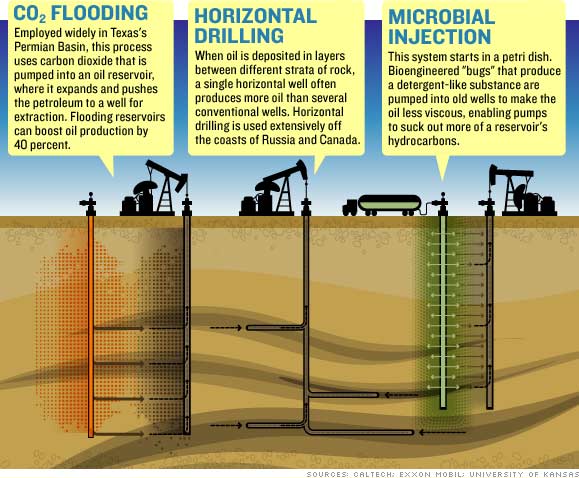|
NEW YORK (Business 2.0) - One of the most promising areas of oil exploration involves a staggeringly simple insight: There are still hundreds of billions of barrels of oil stranded in existing reservoirs.
When a major prospector like BP or Exxon Mobil discovers a promising field, it sets up its equipment and spends years extracting oil until the pressure in the wells ebbs and it becomes more difficult -- and costlier -- to force the stuff to the surface. Once the output starts to decline, the majors often sell off the asset to a smaller petroleum firm and move on to the next field.
When they depart, these giants can leave as much as 70 percent of the well's resources untapped. That realization has companies like Anadarko Petroleum, Newfield Exploration, and others scrambling to apply advanced oil recovery techniques to these aging fields.
Their methods range from the straightforward (pumping water into the wells to force out the oil) to the truly inspired -- like filling wells with bioengineered microbes that help release oil stuck in microscopic holes, making it easier to extract. Called microbial-enhanced oil recovery, this approach is being perfected by researchers at Caltech and the University of Kansas.
Dane Cantwell, an area manager at Anadarko Petroleum, estimates that applying these secondary and tertiary techniques could raise production from existing oil fields tenfold. At the Forties oil field in the North Sea, Apache has boosted annual production by 100 percent to 80,000 barrels a day by installing new pumps to increase water flow.
The techniques aren't cheap -- some can cost as much as $3 million per well -- but with many analysts expecting oil prices to remain high for the foreseeable future, enhanced oil recovery methods are attracting a flood of new players. "Most people say the easy oil has been found," says Richard Ward, director of research with the Cambridge Energy Research Association.
"So these techniques are not only attractive, they're absolutely mandatory to keep the oil flowing."


|